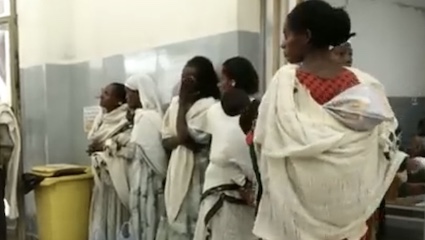Famine in Ethiopia: Amhara and Tigray (Drone Strikes)
Kanako Mita, Sawako Utsumi, and Lee Jay Walker
Modern Tokyo Times

Local authorities in Tigray confirm that over 200 hundred people have died from starvation in the town of Edaga Arbi.
In November, authorities in Amhara and northern Tigray also confirmed that over 50 people died from starvation. The majority of these deaths occurred in Yechila (Tigray), with the other deaths being reported in Wag Hemra (Amhara).
The BBC reports, “When alleged looting of food aid was uncovered by the World Food Program and USAid last Spring, they halted aid to Ethiopia for months on end until resuming at a more cautious rate in December. Close to 1,500 people reportedly died of starvation during that time in Tigray.”
Dr Kahsay based in Shire (Tigray) told the BBC, “People have accepted daily mourning and funerals, and they have understood that they are destined to die.”
It is estimated that 20 million people in north Amhara, Tigray, and parts of south Ethiopia require essential food assistance.
AMHARA – ETHIOPIA AND DRONE STRIKES
Even with famine stalking parts of Amhara and Tigray, central Ethiopian armed forces have used artillery and drone strikes against Fano and Amhara militias. These drone strikes have even hit schools.
The United Nations High Commissioner for Human Rights (OHCHR) reports, “On 6 November, a drone allegedly launched by Government forces struck a primary school in the Wadera district, killing seven people, including three teachers. Reports also suggest Fano militias had occupied some parts of the campus.”
Only three days later (and further drone strikes since) the OHCHR continues, “Another drone attack hit a bus station in Waber town on 9 November, killing 13 people who were waiting to board a bus. Fano militias were reportedly active in the area and attacking ENDF camps in Debre Markos and other smaller towns in East and West Gojjam zones, when the drone struck. Such attacks amount to arbitrary deprivation of life under international human rights law.”
Accordingly, despite deaths from famine earlier last year, the central government opened a fresh military onslaught against the people of Amhara. This intimidation at such a delicate period is synonymous with the mindset of Prime Minister Abiy Ahmed of Ethiopia.
The Wilson Center (Adane Tadesse) reports, “Less than ten months after the November 2022 signing of the Pretoria Agreement that ended the two-year-long Tigray crisis, the second-largest region—the Amhara region—in the country is in turmoil as a result of the outbreak of a military confrontation between the Federal Army and the Fano armed groups since August 2023. As such, there is growing fear that Ethiopia is once again sliding into a protracted civil war. The state of emergency declared in the Amhara region has also further exacerbated insecurity with mass arrests, extrajudicial killings, internet blockages, and disruptions to basic services being the order of the day. As the conflict escalates, several local and international actors (including the United States) have expressed concern and called for peace.”
OVERALL
Regional grievances in Amhara, Tigray, and throughout Ethiopia need to be addressed by the central government rather than the military option – and pitting ethnic groups against each other. Instead of this, Abiy seeks to dictate to regions by military power concentration, political subservience, and ethnic massacres.
Tragically, no sooner had an agreement been reached between the Ethiopian government and the Tigray People’s Liberation Front (a conflict involving other ethnic groups, including the Amhara), Abiy then turned his attention to power concentration over the Amhara region and negating the fears of the Ahmara concerning ethnic and religious massacres.
Famine stalks Amhara and Tigray concerning the military angle of Abiy’s power concentration policies.
In recent months, artillery and drone strikes have killed the Amhara. Also, Amhara Christians have been killed in Oromia.
Abiy must address ethnic, political, religious, and other important areas to solve protracted problems. Ruling by fear and intimidation – with famine stalking parts of Amhara and Tigray – is beyond the pale.

Modern Tokyo News is part of the Modern Tokyo Times group
http://moderntokyotimes.com Modern Tokyo Times – International News and Japan News
http://sawakoart.com – Sawako Utsumi and Modern Tokyo Times artist
https://moderntokyonews.com Modern Tokyo News – Tokyo News and International News
PLEASE JOIN ON TWITTER
https://twitter.com/MTT_News Modern Tokyo Times
PLEASE JOIN ON FACEBOOK
https://www.facebook.com/moderntokyotimes